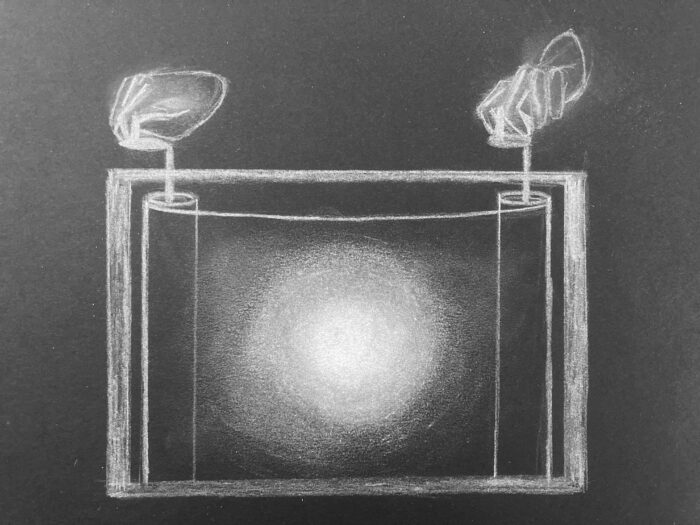read
Crankie, the following words, and
imagine
being a theatre audience is not as natural as it seems. Among the many expected tasks to be accomplished, the most problematic—yet indispensable and intuitive—one is to act along with those on stage and commit to the construction of an invisible wall. As if that is not challenging enough, now experiment with
read
it, theatrical by itself, as if the premise of physical reality could be disregarded. Unlike an audience, readers neither bother to hide in the dark, nor have any moral concerns about being an omnipotent peeper. The violation, however tactfully concealed under this act, is nearly as condemned and acknowledged compared to that of watching due to its nature.
read
the small black strokes, drift, the eyes, sucked into the brain, and in there the space, the action, and the audience is
one.
read
to look at the invisible, we witness the perpetual cycling of death and reincarnation as our eyes caress the words, only to find a vitality so strong it burns, an uncanny intimacy…how
she
had lived…lived on and on…[1]
in pure isolation,
read
………, Words.
right, phew, all relieved.
no breath, not a human being, not a character growing flesh and skin, so thin, in
the Reality.
yes…
eyes wide open…cannot stop…right back
stares…
certain vowel sounds…What?…who?…no!…she!…….the buzzing?…..yes…….all dead still but for the buzzing[2]
read
those imprisoned. On or off stage, we are no different on either side of the wall. Cannot go on. Thought you were safe, didn’t you? Now the space is filled with disturbance, and the darkness encompasses an anxiety of full exposure.
read
shadows: the perfect metaphor for a half-being, with the ability to simultaneously become and decease, to be, just shadows, forming and disappearing, always there and not there, talking to somebody and to no-body, screaming to get out and sinking right back in.
read
theater? Are imagination and performance contradictory? Is it problematic to assume that a script is to be read? How is a script, a “theater to be made,” considered theater at all? Should we create a world with no limits on a physical stage, or at least present that infinity? Is watching (in comparison) more ethical? Why do we immediately accept, or ignore the theatricality of presentation and representation in any form?
read
the crankie. How cruel: paper is not more organic than the human body, and the crinkling sound only reminds us of what it was, then melted, and then reformed, so are
words.
what could stand in between us?
What…who?…we?…no!
Is it problematic to assume that Crankie and the following words should be “read”?
Being a theater audience is not as natural as it seems. Among the many expected tasks to be accomplished, the most problematic—yet indispensable and intuitive—one is to act along with those on stage and commit to the construction of an invisible wall. As if that is not challenging enough, now experiment with reading.
It is theatrical by itself, as if the premise of physical reality could be disregarded. The violation, however, tactfully concealed under this act, is nearly as condemned and acknowledged compared to that of watching due to its nature. Unlike an audience, readers neither bother to hide in the dark, nor have any moral concerns about being an omnipotent peeper. The words are sucked directly into the brain, and in there the space, the action, and the audience merge into one.
To read is to look at the invisible. Readers witness the perpetual cycling of death and reincarnation as their eyes follow the lines, only to find a vitality so strong it burns, and an uncanny intimacy, generated from pure isolation.
It is not real.
Right…phew…all relieved…no!… words are moving…eyes wide open…stares back…What? . . . who? . . . no! . . . she![3]
Not real. Not a human being, not a character growing flesh and skin in “the reality.” Just shadows, forming and disappearing, simply be-ing, always there and not there, talking to somebody and to nobody, screaming to get out and sinking right back in.
Where is the wall? The emperor is not wearing any clothes. We are no different from those imprisoned on stage. Now the space is filled with disturbance, and the darkness encompasses an anxiety of full exposure. Cannot go on. Thought you were safe, didn’t you? Thought you were in charge, with your body hiding in the dark and your eyes still in your control. Forget about acting, just blend into the shadows—the perfect metaphor for a half-being, with the ability to simultaneously become and decease.
Are imagination and theater contradictory? How is a script, a “theater to be made,” considered theater at all? Should we create a world with no limits on a physical stage, or at least present that infinity? Is watching (in comparison) more ethical? Why do we immediately accept, or ignore the theatricality of presentation and representation in any form?
How cruel: paper is not more organic than the human body, and the crinkling sound only reminds us of what it was, then melted, and then reformed.
What?…who?…we? …no!
[1] Samuel Beckett, The Collected Shorter Plays (New York: Grove Press, 1984), 206.
[2] Beckett, 204.
[3] Samuel Beckett, The Collected Shorter Plays (New York: Grove Press, 1984), 204.
